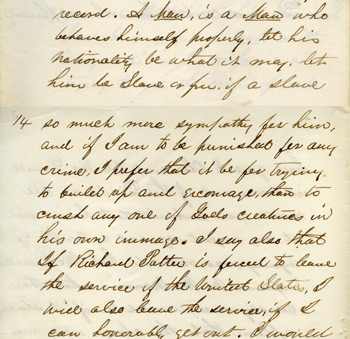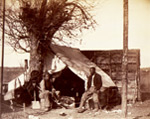Click Center Image for Full Size Picture
Anti-slavery sentiments ran in the Cheney family. John Cheney's Uncle Moses and Aunt Abigail Morrison Cheney were ardent abolitionists. John Cheney's diary gives us a glimpse at how he felt. On January 21, 1863, he wrote, "In August last I enrolled as a Soldier, a young man named Richard Pattee [Petty], it was said, and undoubtedly true that he was a 'Fugitive Slave,' and had escaped from slavery, and come into our lives. Pattee is as white as I am, and his hair is very light colored. his [sic] eyes are blue. he [sic] is a faithful soldier . . . but unfortunately he has been a slave. Some of my men are so much afraid that they will be considered no better than a slave."
Petty was considered contraband—an escaped slave who fled to the Union Army for freedom and protection. Contraband quickly became an issue at the outset of the war; Union forces did not know what to do with those who came to their camps. The Confiscation Act of 1861 stated that slaves who had worked for the Confederate military could not be reclaimed by their owners. Cheney wrote on July 6, 1862, that they received orders to allow contraband inside Union lines in Memphis, and many began work on fortifying the city. During the Civil War, contraband worked on behalf of the Union as laborers and hired servants, while others provided information on Confederate forces.
In January 1863, Cheney was presented with a petition stating that his soldiers objected to the former slave Petty serving alongside them as a soldier and wanted an investigation into the legality of Cheney enlisting him the previous August. Not until later in 1863, when the U.S. Colored Troops regiments were formed, could contraband serve. Even then, the regiments were segregated from the white units, and officers of the colored units were usually white.
Cheney took the petitions (he discovered there were two forms of it among the troops) to the commander of the division. A court of inquiry convened, and by all appearances Petty was able to stay with the unit.
Regarding the affair, Cheney stated in his diary, "If I am to be punished for any crime, I prefer that it be for trying to build up and encourage, than to crush any one of Gods [sic] creatures in his own image."




